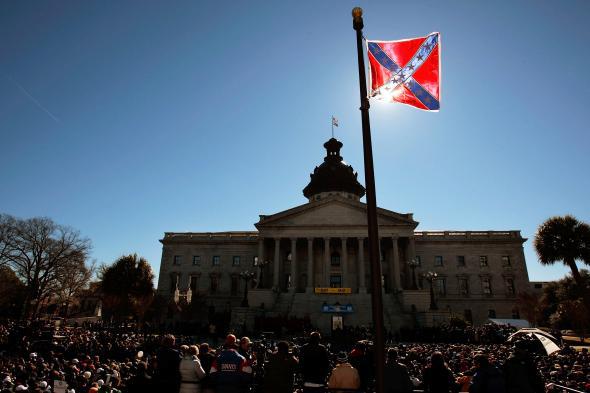March Madness kicks into full swing today with games in Buffalo, Milwaukee, Orlando, and Spokane. Another four cities—Raleigh, San Antonio, San Diego, and St. Louis—will see men’s action on Friday. The women’s tournament then tips off on Saturday with weekend games spread out over 16 other cities. By the time the NCAA crowns a men’s and women’s champion in Arlington and Nashville, respectively, more than 30 cities will have hosted tournament games. None of those games, however, will be in South Carolina or Mississippi. The reason: The Confederate battle flags that still fly over the state capitol grounds in Columbia and Jackson.
In 2001, the NCAA imposed a ban on either state hosting post-season sporting events at predetermined sites (an important caveat I’ll get to in a second) as long as the flags continued to fly, and neither it nor the states have budged since. That is set to change somewhat next year when a format tweak will allow for a key exception for the women’s tournament. But that change won’t be in place in time to help the Lady Gamecocks, who are currently bearing the brunt of the NCAA post-season boycott of the Palmetto State.
The University of South Carolina finished the regular season ranked no. 8 in the nation by the Associated Press, and were given one of four no. 1 seeds in the tournament. The way the women’s selection process works, the committee typically rewards the top 16 teams with, at worst, an easy travel schedule and, at best, the chance to play two of the four games it would take to reach the Final Four on their home courts. But thanks to the ban, the Gamecocks’ first-ever no. 1 seed in the women’s tournament translates to anything but an easy schedule. In fact, the selection committee gave the squad literally the worst itinerary they could.
While fellow one-seeds Connecticut, Notre Dame, and Tennessee all have roads to Nashville that include two games in front of their home fans, the Gamecocks are set to spend much of March on the road—and in the air. The NCAA selection committee is sending the South Carolina women to Seattle for their opening round games, the farthest flung of all 16 sites. Win those, and the Lady Gamecocks will be back on a plane across the country the following week for another two games at Stanford, also the farthest away of those rounds’ host cities. As an added insult, that means South Carolina will likely be playing a road game against two-seed Stanford with a trip to the Final Four on the line.
Compare that to a team like Tennessee, which will spend this weekend at home in Knoxville, followed by a short trip up I-75 to Louisville for the Sweet Sixteen. (The Lady Vols have a particularly friendly road to a title given the Final Four is being held in Tennessee—although they too may need to play a de facto road game in the Elite Eight to make it there.)
The good news for the Lady Gamecocks—at least for those who aren’t seniors—is that they won’t find themselves in the same position next year. Under the current system, the NCAA picks the host cities for the women’s tournament at the start of the season and then typically sends the top seeds to the most favorable location they can. But last month the NCAA announced a change to the women’s format that will have the top 16 teams automatically hosting their first two games. Thanks to semantics, that means those games will no longer be predetermined and therefore the post-season ban, as it currently exists, won’t apply. (Under the new system, however, South Carolina and Mississippi will still be barred from hosting the Sweet Sixteen and/or Final Four.)
***Follow @JoshVoorhees and the rest of the @slatest team on Twitter.***
